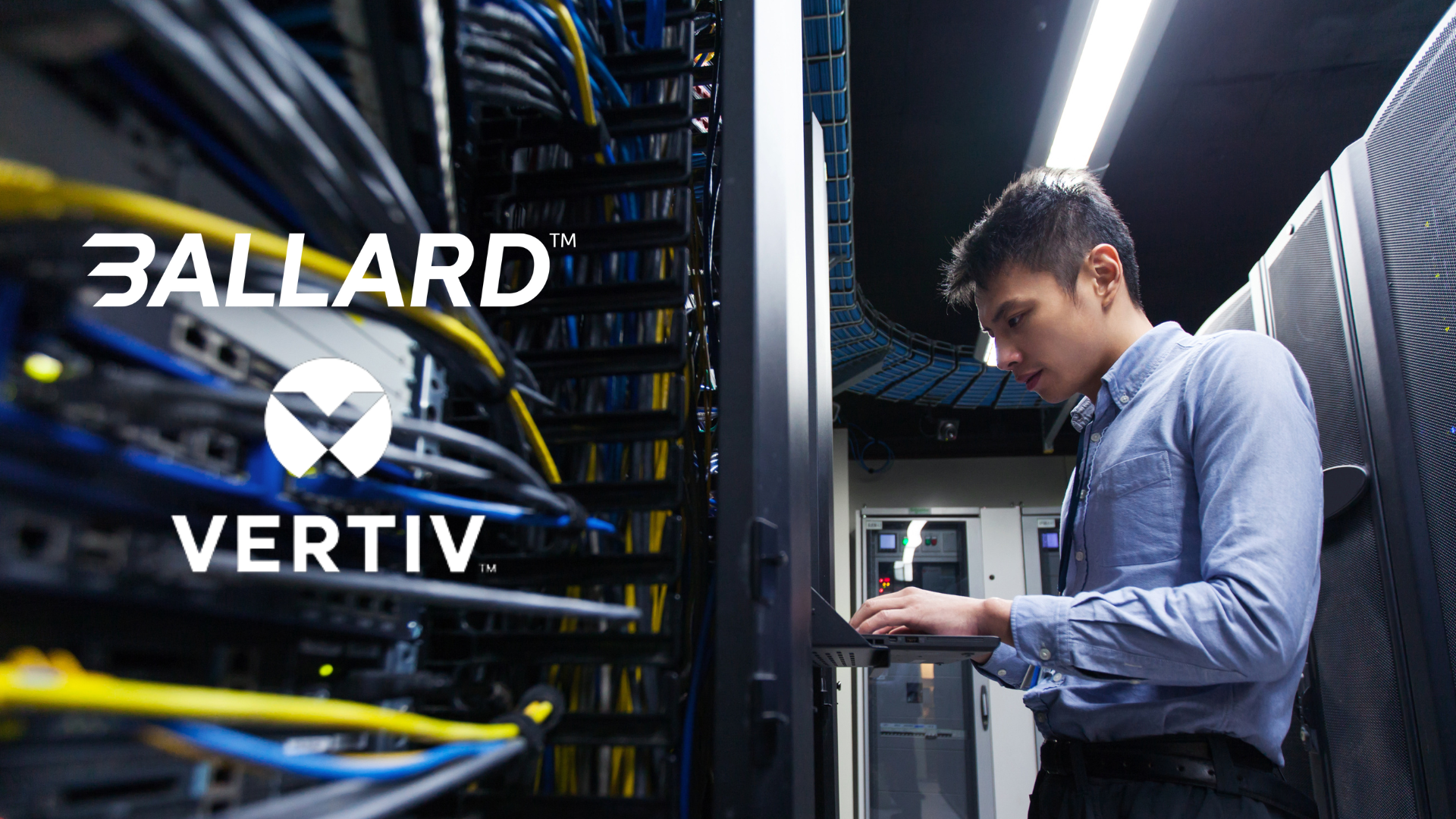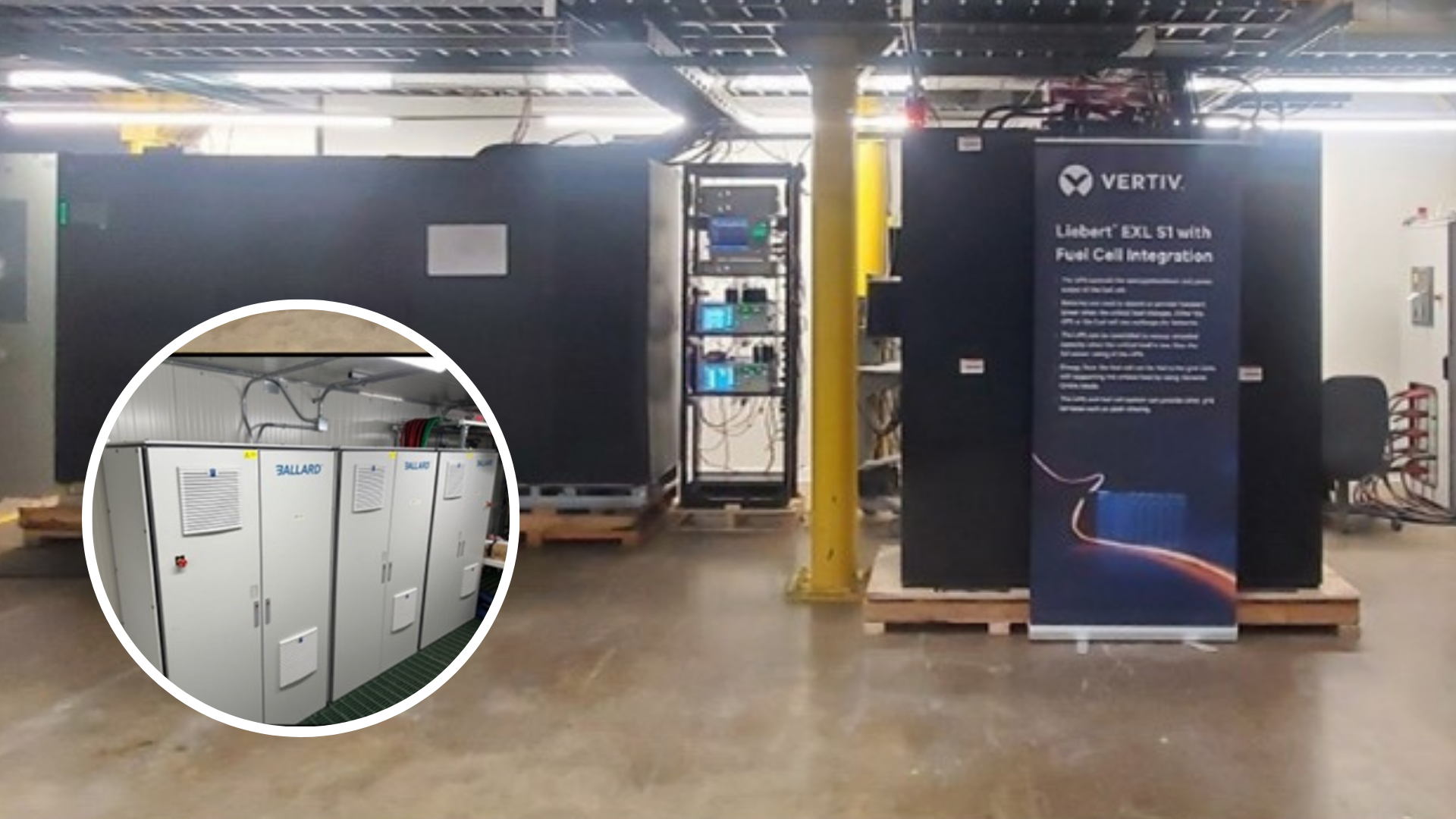
Ballard Power Systems and global critical digital infrastructure provider, Vertiv, have partnered to develop, supply, and install a fully integrated turn-key zero-emission uninterrupted power supply (UPS) system for data centers – a fuel cell solution based on industry-ready component levels.
In this industry-first application, a cross-company team has devised and established a fully functional fuel cell backup system for UPS in data centers – scalable from 200kW to multiple megawatts – while also completing initial validation and testing.
Integrating two Ballard 200kW FCwave™ fuel cells into Vertiv’s Power Module H2 solution, the resulting Vertiv Customer Experience Center microgrid is scalable to 1MW and consists of complete cooling sub-systems, power conditioning equipment, fuel cell site controller, and hydrogen storage infrastructure.
With multi-phase integration testing currently ongoing across global locations, the aim of the project is to deliver UPS with unrestricted hours of zero-emission backup power for data center applications.

Establishing zero-emission alternatives for UPS
Data centers are experiencing rapid growth driven by the increasing demand for Cloud computing, Big Data analytics, IoT, and AI applications. They play a critical role for many businesses, and the importance of these large, powerful units will increase further with greater dependence on digital infrastructure and technology development.
Constant and reliable connectivity is essential in delivering secure, consistent data center services to customers, as even a momentary loss of power can cause economic losses and critical delays. Grid outages can have several causes, but often power is the main issue, emphasizing the need for back-up provisions.
Today, most data centers rely on diesel generators due to a lack of zero-emission alternatives. These generators yield to both carbon and particulates emissions; and with most centers expected to grow in capacity, this threatens to drive up overall emissions.
In 2020, the global data center market was valued at approximately $200bn, and is expected to exceed $600bn by 2030. By next year, it is estimated that 175 zettabytes of data will be created globally - an increase of over 60% from where the industry was in 2020. This massive surge in data generation will drive demand for more storage and processing capabilities in data centers.
To cater for this spike, the number of data centers is expected to grow exponentially to almost double in overall units within a decade, with more than 15,000 in operation by 2030 – reflecting a shift towards edge computing and localized data processing to support low-latency applications – while hyperscale data centers, operated by major Cloud service providers such as Amazon, Microsoft, and Google, are also expanding rapidly.
Enabling this continued growth while adhering to environmental restrictions and regulations, data center operators are now looking to other reliable and future-proof solutions that can help achieve their carbon neutral goals.
In this space, proton-exchange membrane (PEM) fuel cells provide a comprehensive, attractive proposition for data center applications – offering stable, efficient, reliable, and clean backup power for energy-intensive units, assuming the use of renewable generated hydrogen to deliver a zero-emission, sustainable and scalable solution.
What does a fuel cell back-up power system for data centers look like?
UPS for critical infrastructure is very useful in reducing reliance on the electrical grid. It can connect and disconnect the grid depending on the grid’s operational health and forms an electrical island if disconnected from the utility. In addition, this backup microgrid reduces vulnerability caused by service outages by using connected distributed energy storage resources.
The UPS delivers reliable, continuous and automated backup power to customers, when or if the main power fails. In case of a power outage, the UPS system will provide immediate protection by switching to the limited energy stored in batteries. However, should the power outage take place over a longer period, an alternative energy source is needed to take over. In this case, the batteries initiate the fuel cell modules, which can deliver the required backup power through available hydrogen.

Reliable and robust power for data center operation
While diesel GenSets currently dominate the UPS landscape, integrators are investigating the diversification of their power supply sub-systems. Hydrogen fuel cells offer a reliable, emission-free and economic solution as an alternative to existing diesel-powered supply.
As a leading proton-exchange membrane (PEM) fuel cell supplier with a proven history within back-up power systems and large-scale systems for micro grid application, Ballard is a recognized player in the industry and its technology solutions team has already developed, tested, and delivered customized PEM fuel cell backup power solutions. One of its latest projects is a fully functional fuel cell system including two FCwave™-PowerGen fuel cell engines, along with supporting sub-systems, equipment and infrastructure.
The complete system, including UPS and battery banks, was installed at Ballard’s European facilities in Denmark, where the teams carried out the initial validation and testing.
.png?width=1920&height=1080&name=Vertiv%20Delaware%20(1).png)
Progress through collaboration
During 2024, Vertiv has conducted an array of quality and reliability tests to validate the proof-of-concept performances and held multiple customer demonstrations of the system.
Overall validation consists of comprehensive checks on essential elements including mains failure fuel cell automatic start-up and load support, block loading while on fuel cell, and fuel cell recharging the lithium-ion battery without mains power.
The collaborative project team have now completed phase testing of the project in Denmark, Italy, and the U.S. From the extensive real-world experience that has been established in this space across the past few years, which is being built upon constantly, the message to global markets and interested consumers is that hydrogen is safe, viable, and ready for integration into systems - whether new or existing.
The innovative technology delivering critical support has been rigorously tested, satisfying numerous requirements from safety, quality, reliability and efficiency perspectives and is now primed for large-scale market application across industries worldwide, supported by Ballard and Vertiv's team of experts.
Through this extensive industry expertise, the experience and technology assets brought together by the project team is helping to shape the landscape for reliable zero-emission UPS and decarbonize stationary power that supports a global IT sector driven by clean energy.